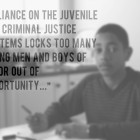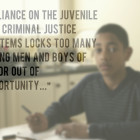
Capitol Hill Roundtable: Interrupt the ‘Poverty-to-Prison Pipeline’
|
You’ve heard about the “school-to-prison pipeline.” Now, add to that the “cradle-to-prison pipeline,” the “poverty-to-prison pipeline” and the “prison-to-poverty pipeline.”
Juvenile Justice Information Exchange (https://jjie.org/page/260/)

In late September, Torri was driving down the highway with her 11-year-old son Junior in the back seat when her phone started ringing.
It was the Hamilton County Sheriff’s deputy who worked at Junior’s middle school in Chattanooga, Tennessee. Deputy Arthur Richardson asked Torri where she was. She told him she was on the way to a family birthday dinner at LongHorn Steakhouse.
“He said, ‘Is Junior with you?’” Torri recalled.
Earlier that day, Junior had been accused by other students of making a threat against the school. When Torri had come to pick him up, she’d spoken with Richardson and with administrators, who’d told her he was allowed to return to class the next day. The principal had said she would carry out an investigation then. ProPublica and WPLN are using a nickname for Junior and not including Torri’s last name at the family’s request, to prevent him from being identifiable.
When Richardson called her in the car, Torri immediately felt uneasy. He didn’t say much before hanging up, and she thought about turning around to go home. But she kept driving. When they walked into the restaurant, Torri watched as Junior happily greeted his family.
Soon her phone rang again. It was the deputy. He said he was outside in the strip mall’s parking lot and needed to talk to Junior. Torri called Junior’s stepdad, Kevin Boyer, for extra support, putting him on speaker as she went outside to talk to Richardson. She left Junior with the family, wanting to protect her son for as long as she could ...

You’ve heard about the “school-to-prison pipeline.” Now, add to that the “cradle-to-prison pipeline,” the “poverty-to-prison pipeline” and the “prison-to-poverty pipeline.”

The week's top headlines in juvenile justice from JJIE and around the web.

Are Connecticut child welfare officials more concerned about avoiding political fallout than protecting children?

Civil rights groups filed a federal complaint Tuesday challenging a Texas city’s ban on providing housing to “refugees” or foreigners such as the Central American children who’ve been turning themselves in at the border.

A life-long New Yorker, Jonathan Lippman, chief judge of the New York State Court of Appeals, uses his role as the chief judge to promote alternatives to incarceration and backed the creation of nine pilot community courts, called Adolescent Diversion Courts.

Iowa policymakers should reject building a new prison for girls and instead, adopt gender-specific, trauma informed treatment in the community for court-involved girls.

Eleven major foundations have pledged to spend a total of nearly $200 million for efforts to help boys and young men of color succeed, in concert with President Barack Obama’s “My Brother’s Keeper” initiative.

This week in juvenile justice: a celebration of peace in a community struggling with gun violence and more.